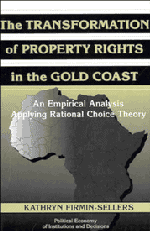 The Transformation of Property Rights in the Gold Coast
The Transformation of Property Rights in the Gold Coast Book contents
- Frontmatter
- Contents
- Series editor' preface
- Preface
- Acknowledgments
- Chapter 1 Introduction
- PART I THE INSTITUTIONS OF THE COLONIAL STATE
- PART II THE REINVENTION OF TRADITION: THE EVOLUTION OF PROPERTY RIGHTS UNDER INDIRECT RULE
- Chapter 3 Institutional failure in the Ga state
- Chapter 4 Institutional creation in Akyem Abuakwa: The politics of property rights
- PART III THE TRANSITION TO INDEPENDENT GOVERNMENT
- Notes
- Bibliography
- Index
Chapter 4 - Institutional creation in Akyem Abuakwa: The politics of property rights
Published online by Cambridge University Press: 08 January 2010
- Frontmatter
- Contents
- Series editor' preface
- Preface
- Acknowledgments
- Chapter 1 Introduction
- PART I THE INSTITUTIONS OF THE COLONIAL STATE
- PART II THE REINVENTION OF TRADITION: THE EVOLUTION OF PROPERTY RIGHTS UNDER INDIRECT RULE
- Chapter 3 Institutional failure in the Ga state
- Chapter 4 Institutional creation in Akyem Abuakwa: The politics of property rights
- PART III THE TRANSITION TO INDEPENDENT GOVERNMENT
- Notes
- Bibliography
- Index
Summary
In chapter 3, I examined a state in which the distributional conflict over property rights institutions was never resolved, leaving both property rights and tradition fluid and poorly enforced. In this chapter, I examine a state in which an alternative outcome was obtained. In Akyem Abuakwa, the distributional conflict over land was resolved; property rights and tradition were fixed and well defined. What accounts for these divergent results?
My analysis of the Akyem case underscores many of the conclusions reached in prior chapters. The indigenous elites responded to the commercialization of land by ‘reinventing tradition. ’ They articulated a notion of customary land tenure that allowed them to profit from the new economic opportunities. Predictably, their declaration of tradition sparked intense conflict within the state over the distribution of land. The institutional structure of indirect rule forced elites to turn to British colonial authorities to resolve that conflict. The ties between local elites and the colonial state were therefore crucial to the enforcement of property rights.
Equally important, the analysis of the Akyem case yields new insight into the study of property rights institutions. In this chapter, I argue that property rights institutions cannot be founded on the basis of coercive authority alone. Coercion is a necessary but not sufficient condition for the creation of a stable property rights system. Property rights will be secure only when citizens have some assurance that the coercive agent will not abuse her authority and confiscate others' wealth, and when the defeated actors are given a positive incentive to invest on the basis of the new property rights system.
- Type
- Chapter
- Information
- The Transformation of Property Rights in the Gold CoastAn Empirical Study Applying Rational Choice Theory, pp. 59 - 90Publisher: Cambridge University PressPrint publication year: 1996


